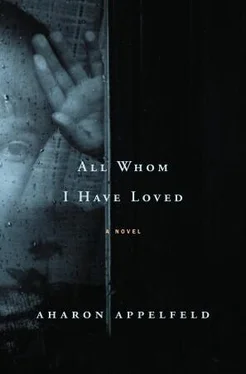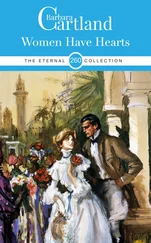In the afternoon, the windows darken even more. Halina sits and knits and I sit and daydream. My daydreams are sometimes so real that they make me dizzy. “Halina!” I shout. Immediately she comes to me and enfolds me in her arms, explaining that bad thoughts are the waste products of good thoughts and that they have to be cleansed from one's mind.
“How do you cleanse the mind?”
“With song.”
So she begins to sing, and I fall asleep in her lap. I sleep for an hour, sometimes two. This sleep in Halina's lap is a soft sleep. She strokes my head and sings quietly. Sometimes I sleep until Mother returns.
When Mother comes into the house, Halina says, “The child is sleeping.” I hear her voice clearly but don't open my eyes. Halina tells Mother everything she's done and everything that we've done together. She concludes by saying, “The child's already been sleeping for two hours.”
Now I expect Mother to come over to me, but she doesn't. She takes off her clothes, puts on her dressing gown, and sits in front of the mirror for a long time, cleaning her face. I'm upset that she doesn't come to me and doesn't ask how I am. I've already noticed that in recent weeks she makes up her face frequently, she is easily confused, and in the morning she leaves but immediately returns — she's forgotten the key to her classroom or her umbrella. I have no doubt that there's something going on with her; all her movements tell me. Sometimes she seems angry with me for watching her so carefully. I'm afraid of my thoughts and tell myself over and over again that Mother would never abandon me.
Halina again surprises me. “Don't you want to go to school?”
“No.”
“All Jewish children excel at their studies — don't you want to be outstanding?”
“No.”
“Strange.”
Mother had tried a few times to have the ban that Father had put on my schooling rescinded, but Father stood his ground and it never happened. Sometimes I believe that Father invented my sickness only to free me from school. Father hates schools and vowed, in his heart of hearts, that he would never send me to one.
“Who taught you how to learn by yourself?” Halina asks.
“Father. You can test me,” I say, sure of myself.
“Me?” Halina bursts out laughing. “I should test you? I've forgotten everything I learned.”
Just as autumn was bearing down and it began to rain incessantly, Father appeared. He was probably surprised to find Halina at home, since he said, “I'm Paul's father.” Halina moved aside and blushed. I was also astonished, but I immediately recovered and ran toward him.
During the preceding weeks, I hadn't thought about him. He would appear to me sometimes in dreams but as a fleeting shadow. Now he stood there, as if he had come from a different world. I almost said, “Where have you come from, Father?” Halina says that you should not reveal all your thoughts, and so I didn't this time.
A fine rain was falling, and Father covered the two of us with his large umbrella as we left the house. He seemed to have grown taller since I had last seen him. I must have been wrong. We walked down the main street, with Father striding along on my right. His silence was unchanged, and I comforted myself by thinking that we'd soon be sitting in a café. In a café he sometimes came out with some complete, understandable sentences. This time he surprised me; we went straight to a tavern. There was a statue of a black horse at the entrance.
It was three o'clock and the bar was almost empty. Father had brought me a gift: a wristwatch. He immediately put it on my left wrist. I was so moved that tears pricked my eyes. I had known how to tell time from the age of five. Mother was proud of my knowledge in math, and whenever we were sitting around the table or taking a walk, she would give me an exercise and I would work it out.
Father must have forgotten that I knew how to tell time. When I accurately did so, he gulped down his drink with joy and laughter. When Father has a bit too much to drink, his closed face opens up slightly. I told him I also knew fractions. He immediately gave me an exercise, and I solved it easily. “A head full of wisdom,” said Father loudly. I don't recall when I had ever seen him so happy.
Later, he told me that his work in the high school was exhausting. “But it's certainly going to change one of these days,” he added. I did not ask if he was painting. It was a wound I dared not touch. Then he opened up to me, telling me about his studies in the academy and his long stay in Vienna. He spoke rapidly, as if trying to shorten a long tale. Because he hurried, I didn't understand very much, but his voice was penetrating, and there before my eyes were the stone, fortress-like buildings of the academy. I saw the art gallery that was part of it, with tall people walking about. I saw Father, too, dressed in a white suit, like the time we had gone together with Mother to the wedding of Felix Sommer, the artist. I remembered that wedding so well because it was on the banks of the Prut, and at the end of it I had been stung by a bee. Father went on talking and talking. I had never heard him talk so much, and so easily. Only after he's had a few drinks does he begin to loosen up. This time he must have overdone it. More than anything he said, I recall one gesture he made with his right hand, as if to say, “One day I'll remove the impediments and I'll be on my way.” There was no anger in his face, only a steady determination.
And so we sat for about an hour. Then he told me things that I will never, ever forget: “Paul, my love, forgive me for not coming to visit you more frequently, but I've been trapped in that high school like a dog.” I looked into his eyes, wide open and bloodshot, and it seemed to me that he was about to break a chair or a table. I was wrong. He lit a cigarette and chuckled to himself.
When we left the tavern Father's face shut down and his eyes narrowed, and all the way home he did not utter another sound. Our parting, as usual, was hasty, and he immediately disappeared.
I showed Halina my watch, and she said, “You have a very handsome father. Why did they divorce?”
“I don't know.”
“Your father is a charming man.”
I had heard the word “charming” more than once, but this time it did not sound pure to me. We sat by the table and watched the rain. In my imagination I saw Father running in the rain to catch the train, and I prayed silently that he would make it. The last train left at five o'clock.
Mother was late, and when she appeared in the doorway, I told her immediately that Father had been here and had brought me a watch.
“Wonderful,” said Mother, and was silent. Apparently she hadn't expected him to come. “What did the two of you do?” she asked.
“Nothing much,” I said, and didn't tell her that we had sat in a tavern and that Father had talked with great enthusiasm.
“So, what did you do?”
“We took a walk,” I lied.
The lie weighed on me. Several times I almost admitted that I had lied. Father's surprise visit must have bothered her, for the following morning, she again asked, “So, what did you do?”
“Nothing much,” I lied again.
I wore the watch and felt Father next to me. Since he brought me the watch, I could see his face clearly, and it seemed that any moment he'd come into my house.
“What does your father do?” Halina asked in a voice that carried an unpleasant ring.
“He teaches in high school,” I hastened to answer. I didn't tell her about the painting. There were secrets that I wouldn't tell her, like the way Father drank and had difficulty painting. Sometimes I could feel the tremendous effort he made to save himself from his own silence, and I wanted to go to him and be near him. I knew that Mother wouldn't let me.
Читать дальше












